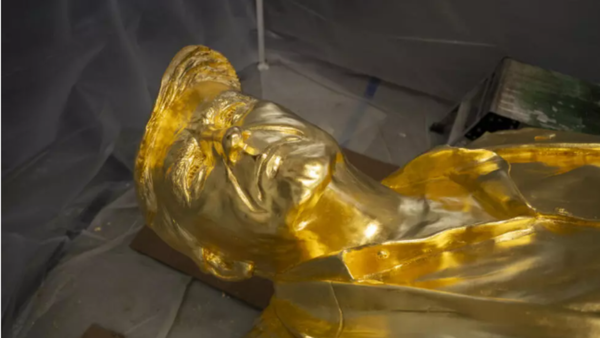
A California lawmaker wants to increase the allowance that people released from prison receive to cover basic needs for the first time in nearly 50 years.
Sydney Kamlager, a state senator representing Los Angeles, is introducing legislation Friday to bump up the “gate money” – funds that people released from state prisons are given – from $200 to nearly $2,600.
“This is really about making sure that when people get out, we are not perpetuating a cycle of economic violence,” said Kamlager, whose office exclusively shared with the Guardian plans to introduce the new bill. “We have got to stop legislating poverty.”
This is the first major effort to increase gate money in recent memory. The roughly 600,000 people released from federal and state prisons each year are usually offered a pittance – if anything – to buy a bus ticket home, or a first meal, clothing and toiletries. California currently provides a debit card loaded with at most $200, though people serving short sentences receive even less. It already offers more than other states, an investigation by the Marshall Project found. Colorado, Texas, Florida and some other states provide $100 and Louisiana and Alabama offer just $10.

California last increased the amount of gate money it offers in 1973 when $200 could cover a month’s rent. “Now that money is simply insufficient to survive,” said Samual Nathaniel Brown, the co-founder of the Anti-Violence Safety and Accountability Project.
When Brown was released in December after being incarcerated for 24 years, the first thing he bought was a meal for his wife, his two daughters, his sister and his niece. It was a way to thank them for their love and support throughout his imprisonment. They got Korean barbecue, and the bill was about $140.
“And there went my gate money,” he said.
Brown considers himself blessed that his family picked him up from prison, and he has been able to depend on them after his release. For those without people to lean on, the $200 can be a taunt – or a sign to simply give up, he said.
Re-entering society after years or decades behind bars can be rough, with scarce housing and job opportunities available for people with a criminal record. Parole requirements, obligations to family, outstanding debts and health needs stack up quickly, and can be a steep hill to climb.
More and broader reforms are required, said Kamlager and the activists she is working with – including of the low wages paid for exploitative prison labor. But upping gate money is also urgently necessary, she said.
People often enter prison impoverished and are being thrown into poverty upon release, Kamlager said. The system “perpetuates a fall deeper into desperation for folks who have just been released”, she added.
Kamlager is proposing increasing the allowance to $2,590 after consulting with federal data on the cost of food and housing, and the Massachusetts Institute of Technology (MIT) Living Wage Calculator, to find the average monthly expenses for a single adult with no children in 2021. Starting in 2024, the bill specifies that the allowance should also be adjusted annually to account for inflation. Kamlager pushed to introduce the bill on Friday, which is the last day to broach new bills during this legislative cycle.

It costs California more than $8,800 to keep someone incarcerated each month, the senator noted – and increasing gate money allowance would cost the state less than pushing those just released back into the prison system.
Kamlager said she decided to introduce the legislation after receiving a letter from an incarcerated person, asking, “How do you expect any of us to make it if we’re getting out with just $200?”. “It struck a chord,” she said
“In 2022, when the price for a gallon of gas in Los Angeles is almost $5, it is unconscionable that the state of California still gives just $200 in allowance for folks who are getting out of prison,” she added.
Experts view a person’s first 72 hours after release as a vulnerable, crucial time that can determine whether or not they end up back in prison, said Amika Mota, the policy director for the Sister Warriors Freedom Coalition, a group that is working with Kamlager’s office on the bill.
In a criminal justice system that purports to uphold public safety, providing a pittance to people when they are released is “counterproductive public safety”, Brown added. “Not having enough money, it makes people think ‘I need to do something fast.’ And that’s the same type of thinking that led most women and men to prison to begin with.”
For mothers leaving incarceration, $2,600 could offer a chance at finding secure housing and reuniting with their children, Mota said.
Amid the pandemic, when re-entry after release has been especially perilous and chaotic for many, a pilot program by the nonprofit Center for Employment Opportunities (CEO) has been distributing $2,750 in cash assistance to people leaving prisons all over the US. An early evaluation found that participants were able to use the funds to buy food, pay for transportation and contribute to caring for families. Some participants said the money helped lift them out of homelessness.
Meanwhile, Rasheed Stanley-Lockheart, a reentry director for the Ahimsa Collective, a restorative justice non-profit said, “I’ve seen guys come out holding that $200 in their hand, and it’s almost like they don’t know what to do with it because they’re scared.”
“We need much more than that to survive,” he said.







